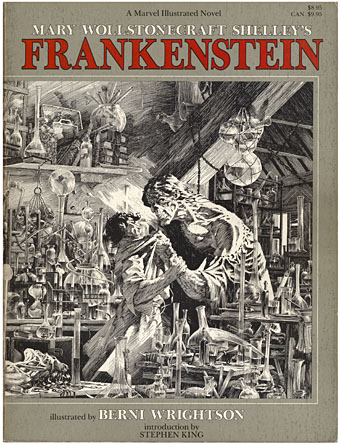 First up, "verdâtre". In the King James Version, Revelations 6:8 reads: "And I looked, and behold a pale horse: and his name that sat on him was Death, and Hell followed with him. And power was given unto them over the fourth part of the earth, to kill with sword, and with hunger, and with death, and with the beasts of the earth." But, believe it or not, it gets creepier in the French SG21 translation, where that pale horse is "verdâtre", or "greenish." Just like pus. Or decay. Or the Frankenstein's monster, which only adds to the oomph, don't you think?
First up, "verdâtre". In the King James Version, Revelations 6:8 reads: "And I looked, and behold a pale horse: and his name that sat on him was Death, and Hell followed with him. And power was given unto them over the fourth part of the earth, to kill with sword, and with hunger, and with death, and with the beasts of the earth." But, believe it or not, it gets creepier in the French SG21 translation, where that pale horse is "verdâtre", or "greenish." Just like pus. Or decay. Or the Frankenstein's monster, which only adds to the oomph, don't you think?Except that the Frankenstein's monster was actually yellow in the original. But then, 60% of all newborns get jaundice.
Secondly, thanks to John Sutherland, who in his collection of literary questions, "Who Betrays Elizabeth Bennet?" raises the best question of all, "Why isn't everyone a vampire?" I'm going to quote Mr. Sutherland here (pp. 239-240):
"Let us assume that each vampire infects one victim a year, and that this victim dies during the course of the year to become, in turn, a vampire. Since they are immortal, each vampire will form the centre of an annually expanding circle, each of which will become the centre of his or her own circle. The circle will widen at the rate of 2(n-1). In year one (say, 1500) there is one new vampire, in 1501, two, in 1502, 4; in 1503, 8; and so, by the simple process of exponential increase, there will be 1,204 new vampires in 1510. And, since they never die, the numbers are swollen cumulatively. Within thirty-one years the vampire population will have reached 2 billion. By 1897, the presumable date of Stoker's novel, the numbers are incalculably vast. In fact, so vast that they will probably have collapsed to nil. Long since everyone will have been vampirized; there will be no more food-supply... Dracula and his kind will die out. And with them, the human race."
Going out, we presume, with a whimper of hunger…
BTW, this idea works perfectly with werewolves, too. After all, if you get scratched/bitten by a werewolf, you become a werewolf, so we should all be werewolves by now, right? And, on top of that, the children of werewolves become werewolves, making (as a friend of mine pointed out) werewolves the original anchor babies!
Meanwhile, back in SD, the dog and pony show continues.
Attorney General Marty Jackley (remember him?) held a press conference on Tuesday, November 3, 2015, at 1:00 p.m., at the Community Center adjacent to the Platte City Hall building, Platte, S.D, to discuss the investigation in the deaths of the Westerhuis family.
BTW, this idea works perfectly with werewolves, too. After all, if you get scratched/bitten by a werewolf, you become a werewolf, so we should all be werewolves by now, right? And, on top of that, the children of werewolves become werewolves, making (as a friend of mine pointed out) werewolves the original anchor babies!
Meanwhile, back in SD, the dog and pony show continues.
Attorney General Marty Jackley (remember him?) held a press conference on Tuesday, November 3, 2015, at 1:00 p.m., at the Community Center adjacent to the Platte City Hall building, Platte, S.D, to discuss the investigation in the deaths of the Westerhuis family.
For the saga to date about the Westerhuises, the federal GEAR UP monies, and a variety of missing funds, see my last SleuthSayers post, "A Little Light Corruption".
I had already told everyone who expected a great deal of detail, substance, even some actual news, that they should meet outside, later, for a special preview of "Bambi Goes Hunting With an Uzi." Jackley did not disappoint. He announced that it was obvious that Mr. Westerhuis - after hearing that the GEAR UP! grant was being cancelled - shot and killed his wife and his four children, poured [unidentified] accelerant all over the house and then shot himself. Period. This all happened some time around 3 A.M. Apparently the Westerhuises had surveillance cameras, but they recorded nothing, and neither of the two (!) security systems were tripped.
Two interesting and very understated points:
Two interesting and very understated points:
- Someone called Nicole Westerhuis' cell phone from the Westerhuis landline, leaving a voice message, but the message can't be retrieved because the account was cancelled. (Obvious questions: When were the accounts cancelled? Who cancelled them?)
- The Westerhuis safe is missing. Mr. Jackley asked that if anyone knew anything about the whereabouts of the safe to please call him.
Meanwhile, a new bit of crazy has arrived in time for Halloween. Now, this is a two-parter:
 An original, handmade South Dakota flag dating back to Deadwood’s Old West days that went missing from former Secretary of State Jason Gant’s office in January has been returned to its home in the state Capitol. Garrett Devries, former employee of former South Dakota Secretary of State Jason Gant, former intern of our own Senator John Thune, and "Republican operative," picked it up and took it with him to Washington because "it was cool." (I suppose he never heard that theft was wrong...) He's being charged with a misdemeanor, and is working on a plea deal. (Funny how we can spend money and manpower tracking down a flag, but not the $147 million lost to the EB-5 program...)
An original, handmade South Dakota flag dating back to Deadwood’s Old West days that went missing from former Secretary of State Jason Gant’s office in January has been returned to its home in the state Capitol. Garrett Devries, former employee of former South Dakota Secretary of State Jason Gant, former intern of our own Senator John Thune, and "Republican operative," picked it up and took it with him to Washington because "it was cool." (I suppose he never heard that theft was wrong...) He's being charged with a misdemeanor, and is working on a plea deal. (Funny how we can spend money and manpower tracking down a flag, but not the $147 million lost to the EB-5 program...) |
| Former Secretary of State Jason Gant, looking a little spooked for Halloween. |
Meanwhile, Mr. Gant is accused of being "$43,000 short of what the in-house books said, losing three iPad Minis out of thirty purchased for his over-hyped military voting program, misappropriating tens of thousands of federal Help America Vote Act dollars, failing his statutory duty to print a legislative manual, and letting an employee walk off with a historic state flag." (See above)
(http://dakotafreepress.com/2015/10/30/gant-admits-but-minimizes-mistakes-krebs-needs-democratic-backup-in-pierre/ - once again, thank you to Cory Heidelberger!)
Mr. Gant has admitted that he made "mistakes", but also claims that "his people were just too busy with other projects to get to reconciling the bank accounts... or turn in invoices relating to the federal HAVA money." As for the iPads, well, crap happens.
NOTE: I love South Dakota: one guy (co-director for Leadership South Dakota) can't remember nine $1000 payments for his consulting services, and another guy (a former Secretary of State) misplaces iPads all over the place and loses an historical, hand-made state flag, not to mention a bunch of bucks...
And did you know it costs $18,518.51 per overseas soldier to get them to vote? To quote from our own Argus Leader:
The Secretary of State's office under former secretary Jason Gant used more than $500,000 in federal grant money to help 27 active military members vote last year... "I know that 27 doesn't sound like a wonderful number, but it was a program that 27 people took advantage of," Gant said.... [And he] spent $79,000 on a public relations and marketing firm to publicize the program on a trip to Germany. "The beauty of the system is that if in a few years there were thousands of South Dakotans overseas, they could be using it," said Gant.
Honey, there's only 853,000 people in the entire state - how many thousands are heading overseas? Is this something we should be worried about? Aware of? Prepared for? Pack our bags?
Here’re a few hints, Mr. Gant:
(1) Start smartening up your explanations/excuses/reasons/justifications.
(2) Watch the Maltese Falcon and think about the character of Wilmer, the fall guy.
(3) Don't go hunting alone.
(4) Keep your doors locked at night. Maybe get a dog.

























